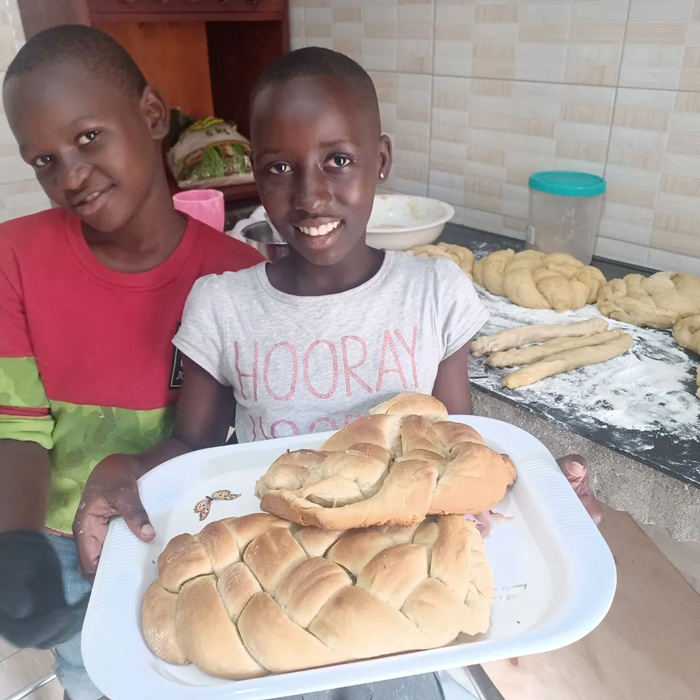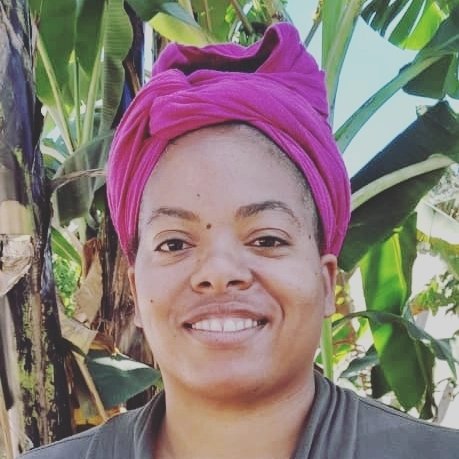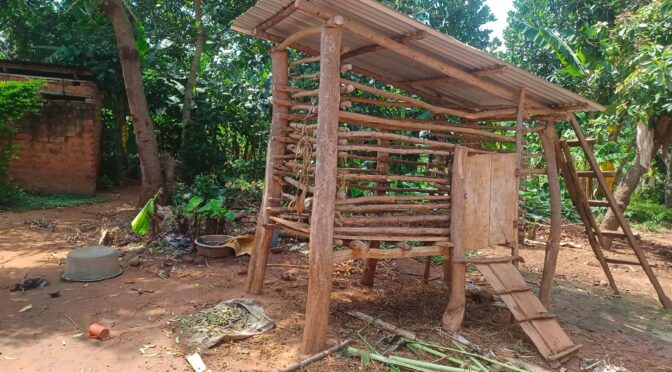There’s so much joy in the Ugandan Jewish experience, but this is not to say there aren’t hardships, too.
By Shoshana McKinney
Jul 10, 2023

I’m a Jewish African American born to Jews by choice in Southern California. As a kid, I was almost always asked to explain or qualify my Jewish identity when meeting a new person in a Jewish space. Other kids would give me the “Jew quiz” while adults at synagogue would give my mother the third degree, so desperate they were to understand how she wound up there. My Yiddishkeit required regular and articulable validation.
Defending my Judaism unequivocally made me a better Jew. I had to get clear on my values and beliefs and owning my place in the Jewish story. Still, I am so happy to pass this legacy down to my son with less drama.
We just had to move to Uganda to get there.
Back in 2020, when my Ugandan Jewish husband couldn’t come back to America because of the pandemic travel restrictions, I had to pack us up and fly over to Uganda, where we have lived ever since. You would be absolutely correct if you imagined a scene of a clueless American being called a weak softie because her keyboard-clicking hands don’t have the calluses required to work a garden hoe for more than 15 minutes. My life is basically the African version of “Green Acres.” Goodbye, city life!
Rural Uganda life requires developing a new set of skills, like remembering to add my 3-year-old son’s de-worming on the calendar and using a pill cutter to chop his weekly anti-malaria pill. All of the life forms thrive here — the ones we like to post on Instagram and the ones requiring medicated bath soap.
Luckily, it takes a village to raise a child, and that is truer than ever here. We live on a family compound with several houses belonging to grandparents, aunties, uncles and even a guest house. My husband built our house from the ground up. Our living room is always open and our extended family is always welcome, and the women in our close-knit family take a soft, nurturing approach. It also means that I am called on to be a motherly figure to any one of my son’s eight cousins at a moment’s notice. (I keep a hoard of bubble-gum lollipops on deck for just that.)
Indigenous Ugandans have been practicing Judaism for over a century. The Jewish community here has around 6,000 members and 11 officially established synagogues — three Orthodox, seven Conservative and a Chabad in the capital. The Jews originate from the area around Mbale, Uganda. Community meals like Passover seders, Purim Seudahs and Shabbat lunches are expected from each synagogue. The Ugandan chuppah is made of sugar cane poles and we eat it at the end of the wedding. There is also an annual sukkah contest where every family can participate; the over-abundance of banana leaves is put to good use.
It’s rare for a Jewish family to celebrate a holiday or a simcha without at least 20 other friends or neighbors in attendance. All the Jews in the area have known and married into each other’s families for generations.

There is only one Jewish primary school and one Jewish secondary school; both offer boarding. But both schools are inconveniently located along dirt roads in the steep, windy, bumpy hills near the mountains approaching Mount Elgon. Instead, my son goes to a preschool that is technically a Christian school, but thankfully it’s quite secular — though maybe not for long. He’s about to teach his classmates the Ugandan melody of “Lecha Dodi” since I’m learning it for a stint and have been singing it compulsively. I’m staying committed to learning more Hebrew Shabbat songs and singing together with the kids all week long so that the songs are deeply ingrained. (Speaking of singing, song parodies can be made by substituting the original lyrics for the words “poo poo.” To my son, I’m instantly considered a comedic genius. But we don’t do this with Jewish songs, thou shalt not.)
Bounding around through the corn and cassava fields, I’m often reminding my little one to keep his kippah on. Wearing a kippah is something my husband also does almost every day. To my relief, I feel completely safe with them doing this in Uganda. Unlike in my former stomping ground of Dallas, no armed guards are outside the synagogue. Nobody here has ever thought about security outside of the possibility of theft of the silver Judaica in the sanctuary.
On our Shabbat walks to synagogue, we pass by wildflowers, a symphony of birds, baby goats, beautiful butterflies and dragonflies. My heart is warmed by these simple treasures. Holding my son’s sweet little hand in these moments feels like such an honor and the highest blessing.
And then we arrive at a synagogue where everyone is Black. This is a rare time that my identity is normalized in a Jewish space. It’s all I could have ever wanted for my son: to be comfortable in his own skin and feel Judaism as an inextricable part of his identity as he grows up.
There’s so much joy in the Ugandan Jewish experience, but this is not to say there aren’t hardships, too. Several of the other Jewish moms who sit next to me in the women’s section of our synagogue have completed a week of backbreaking work in the vegetable fields for only $2 per day. The months of January to March are very hard for most mothers who are waiting for the harvest to come and living off of meager scraps. Some of these moms are food insecure and come to synagogue specifically for the community meal after the prayer service. They bring all of their children to come and eat, watching that not even a grain of rice is wasted.
Most women in the community don’t have running water and collect rainwater from their houses. Whenever that isn’t enough, they have to take their yellow jerricans to the ground water pump, carrying 10 or more liters of water at a time. There are also women so poor they are immobilized for days each month due to lack of feminine hygiene products.
I miss being able to get all of the matzah and kosher wine I want at Passover, like I did back in America. Chabad in the capital city of Kampala is a five-hour drive away and they ration their Passover products — only one sheet of matzah per person at the seder. And I miss not having to make separate stops to buy professionally raised eggs and live chickens for kashrut observance. How convenient it was to get kosher packages of boneless, skinless meat in the grocery store!
Still, discovering the Jewish community of Uganda was like discovering a long-lost cousin I never knew existed. It’s my hope to own houses in both Uganda and America one day so I can continue my work in connecting both of these Jewish communities.
Uganda really does feel like home now. Loving family members, warm culture and natural beauty come together in the life I have always wanted.
Shoshana McKinney

Shoshana McKinney is a traditional Jewish mom and stepmom living in Uganda full-time since 2021. She is the executive director of Tikvah Chadasha Foundation Uganda and a columnist. Find her on Facebook.

